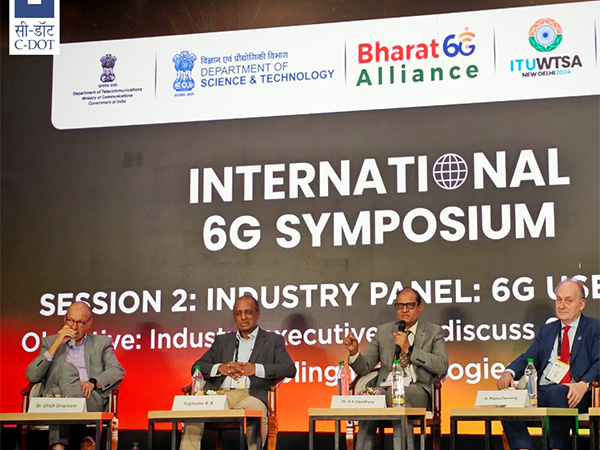
New Delhi: The second day of Indian Mobile Congress (IMC) telecom industry leaders discussed India's tremendous opportunity in advancing 6G technology at the 8th Edition of Indian Mobile Congress (IMC) 2024.
The second day of the event saw the inauguration of International 6G Symposium, launch of Telecom Smart Cities Index by OpenSignal and Workshop with Academicians of 5G Test Labs among other major activities.
The event is jointly organised by the Department of Telecommunications (DoT) and the Cellular Operators Association of India (COAI).
The day showcased futuristic technologies, integration of AI in across sectors and India's digital and telecommunication potential with a range of emerging innovations.
The second day of IMC 2024 began with a breakfast meeting of Jyotiraditya M. Scindia, Minister of Communications and Development of Northeastern Region, with prominent CEOs from leading global companies on the theme 'Leading in the Moment: The Future is Now'.
The International 6G Symposium was inaugurated at the International 6G Symposium during India Mobile Congress 2024 by Minister Scindia.
Highlighting India's ambition to lead global 6G innovation, the Minister emphasised that India, having successfully implemented one of the fastest 5G rollouts, is now poised to shape the future of 6G with standards that are inclusive, accessible, and affordable for all.
He underscored the importance of cybersecurity and India's capability to contribute to the formulation of 6G regulations.
Opensignal's Indian Cities Digital Readiness Ranking (ICDRR) assesses 50 Indian cities' mobile infrastructure, highlighting their readiness for smart city transformation through 4G/5G Availability, Consistent Quality, and Overall Download Speeds. Top 5 ranked cities in India are: Srinagar, Agra, Faridabad, Jaipur and Patna.
During the day, the workshop with academicians of 5G test labs included discussions on enhancing indigenous 5G network for 5G+/6G standard, role of enterprise private networks, network transformation with 5G/5G+ and applications for enterprise verticals, industrial 5G use cases and live demos done by 5G ACIA in their test beds. The leaders deliberated on 5G (IOT) Use cases in industries, healthcare, smart grids, agriculture, education, among others.
The day also featured important sessions and panels which included Supercharging India through Equitable AI, Future unveiled: Key insights for the new techade, Securing the Digital realm: Enhancing cyber defense, Techos pioneering the future of private networks, AI driving Autonomous networks of the future (Part A), AI-enhanced processing among others.
The extensive lineup of more than 100 sessions continued on the second day, highlighting the transformative potential of emerging technologies and role of AI across industries such as telecom, satcom, semiconductors, cybersecurity, education, cloud & edge computing, electronics manufacturing and their impact on society and the economy worldwide.
"India is becoming a focal point for global innovation in technologies. The IMC and the ITU-WTSA is playing crucial roles in showcasing products, setting standards, and driving collaboration. As a leader in the 6G Alliance, India aims to collaborate with partners to advance research, standardization, and public-private partnerships. Joint research efforts, policy harmonization, and the development of skilled manpower are key priorities. Through these initiatives, India seeks to position itself as a global leader in 6G technology and drive innovation and development," Neeraj Mittal, Secretary, DoT said.
N. G. Subramaniam, Chairman, Bharat 6G Alliance said, "Although the future is difficult to predict, we will witness seamless connections between humans and machines and various other devices if we keep connecting the dots with ceaseless innovations. Undoubtedly, we are gauging humongous possibilities with the emerging digital and communication technologies. However, for this, a reliable, secure, and trusted next-gen network is essential to bring these ideas to a consequence and improve the overall quality of life on Earth.
He added that Bharat 6G Alliance is working closely with the academia, TSPs, R&D organisations, and OEMs for the success of the innovation in the telecom sector.
Savi Soin, Senior Vice President and President of Qualcomm said, "We have best-in-class engineers that are working on autonomous and IoT devices that are customizing the solutions for the Indian market. To give back to the community we have semiconductor workshops that enable students and startups to gain hands on experience of our technology and its capabilities."
Tarun Chhabra, Sr. Vice President and Country Head, Nokia India said, "We are also working on boosting the sensing capacity of networks, which can facilitate enhanced and autonomous use cases. The future will be driven by robust collaboration between the customer and partner ecosystem, opening up of networks for innovation and interoperability. The next techade will witness the fusion of digital and physical worlds, augmenting human capabilities with AI-enhanced networks that sense, think and act being vital for this evolution."